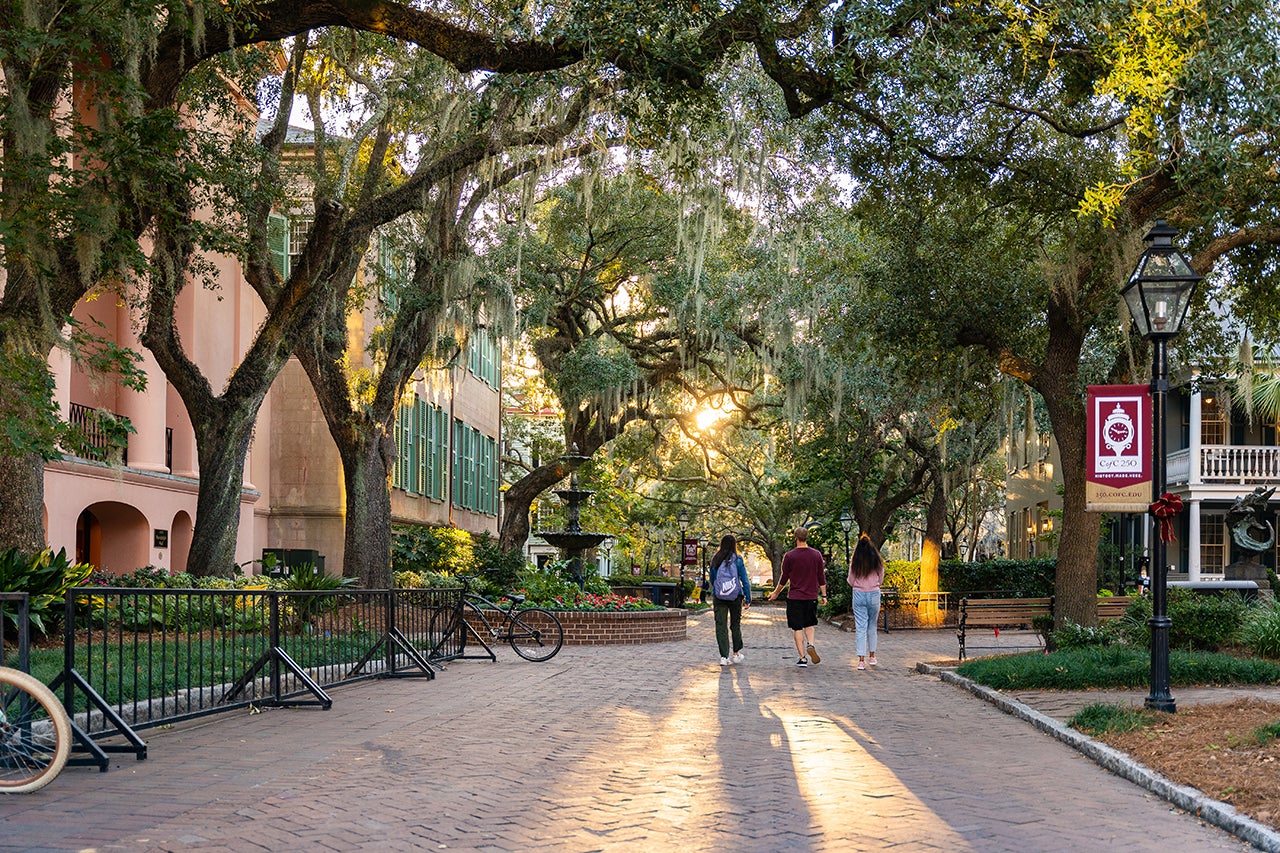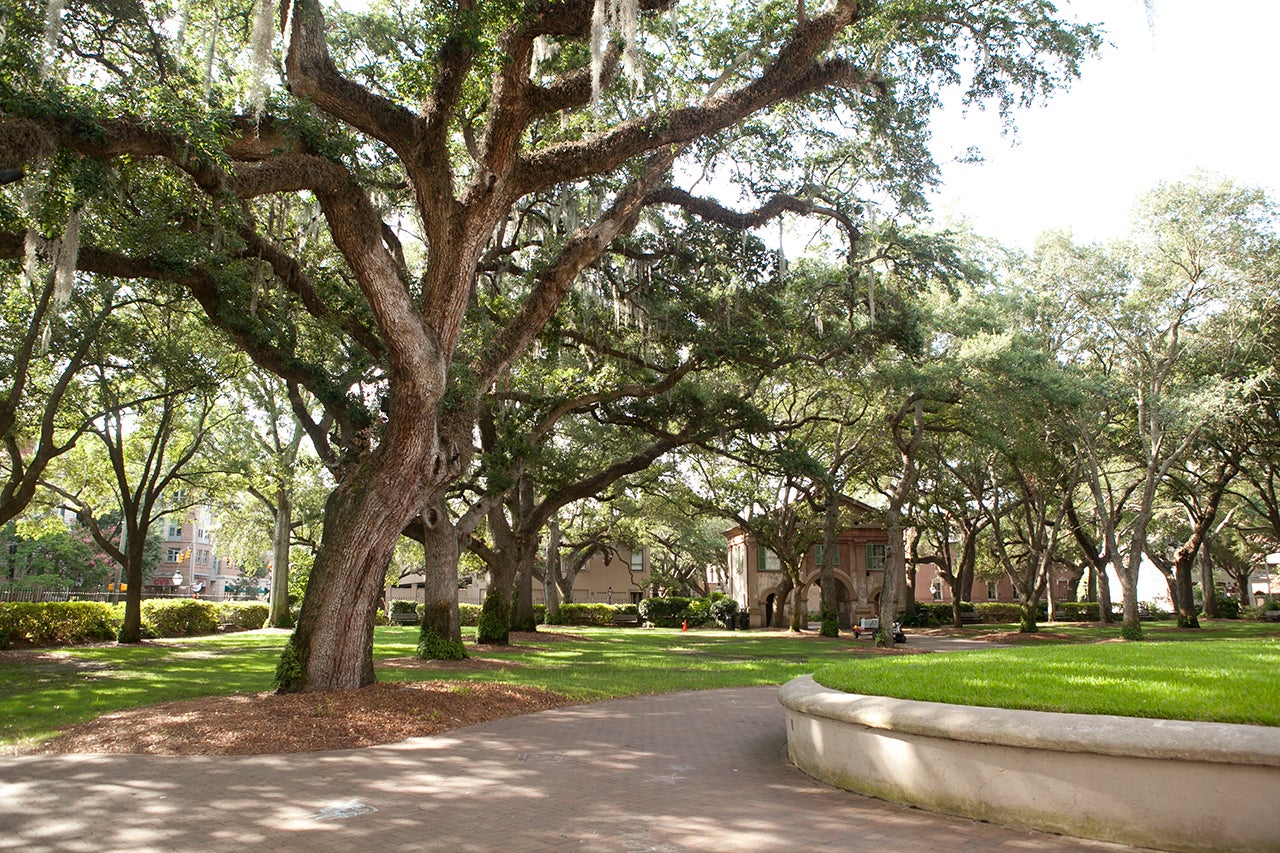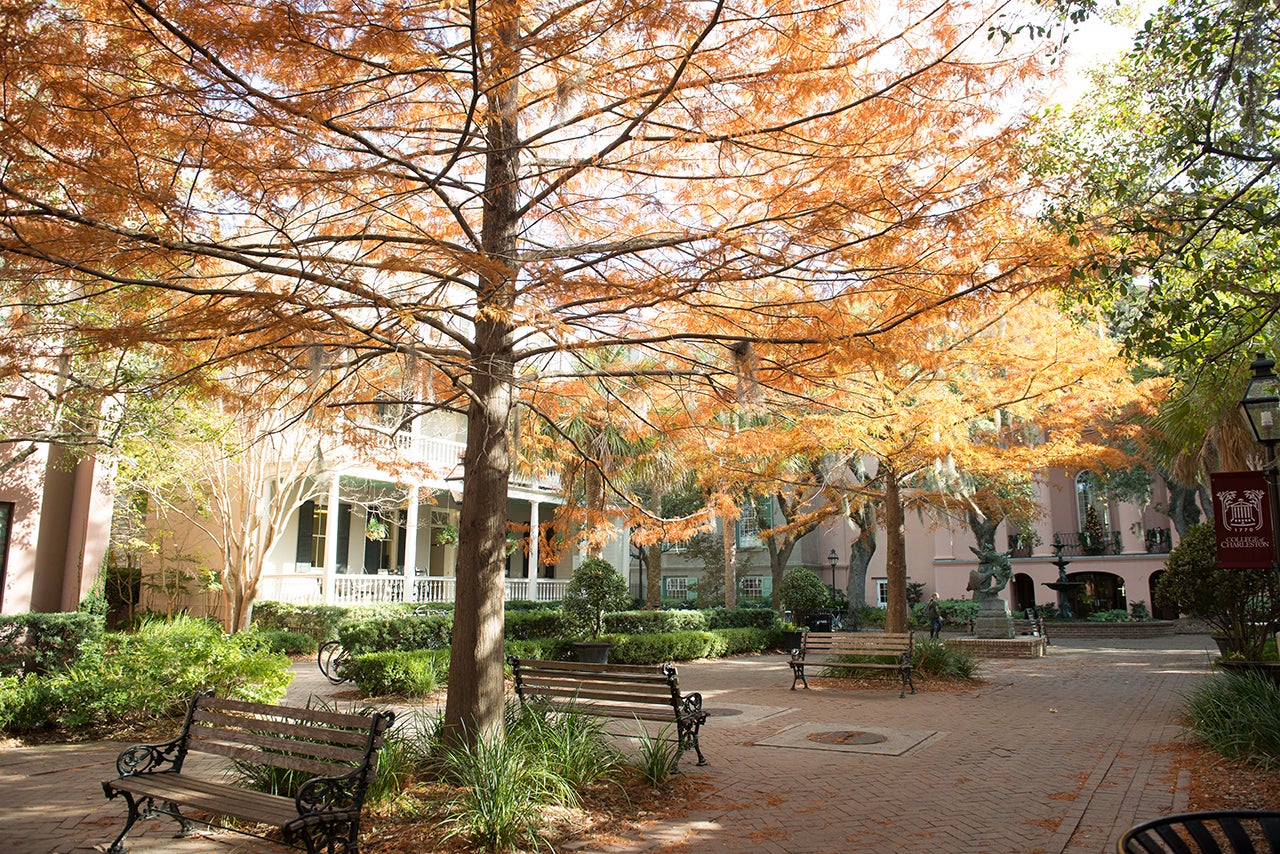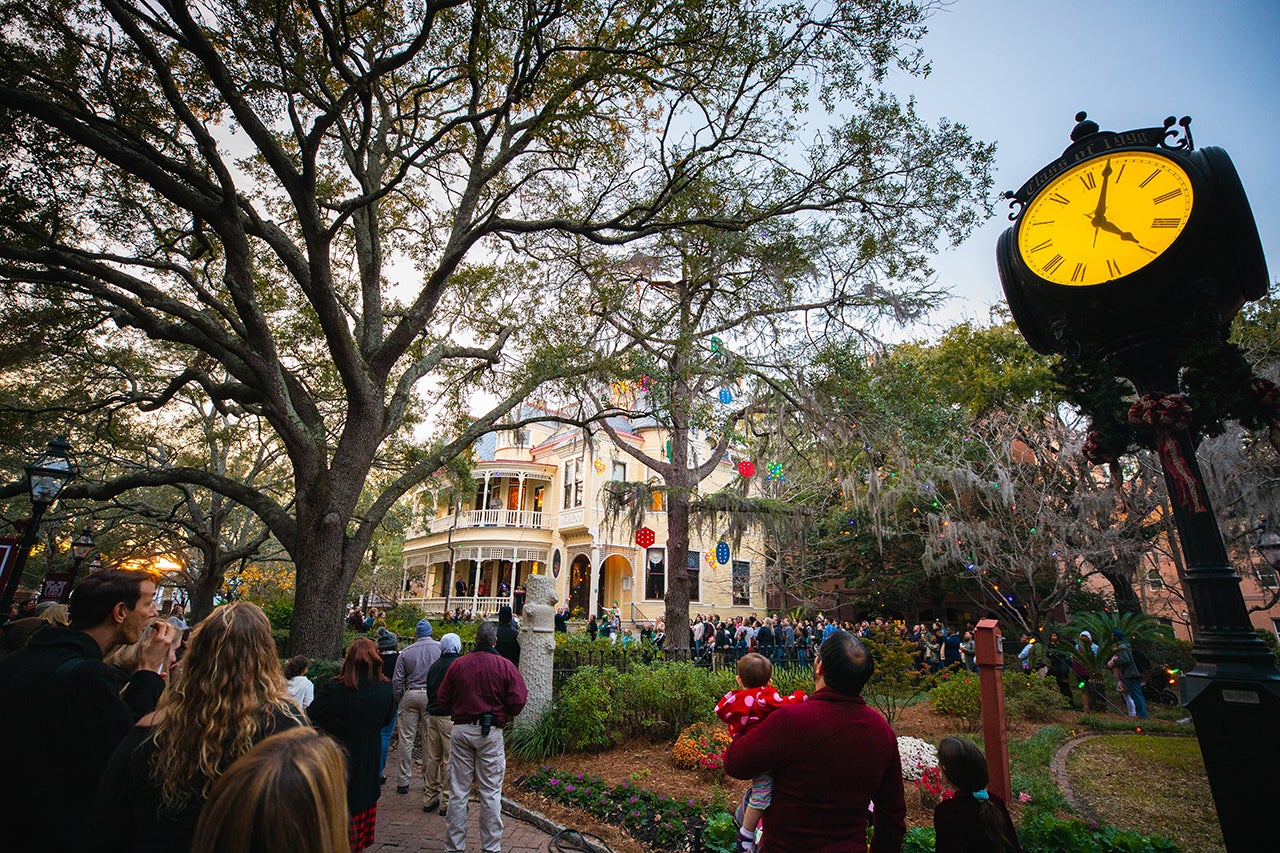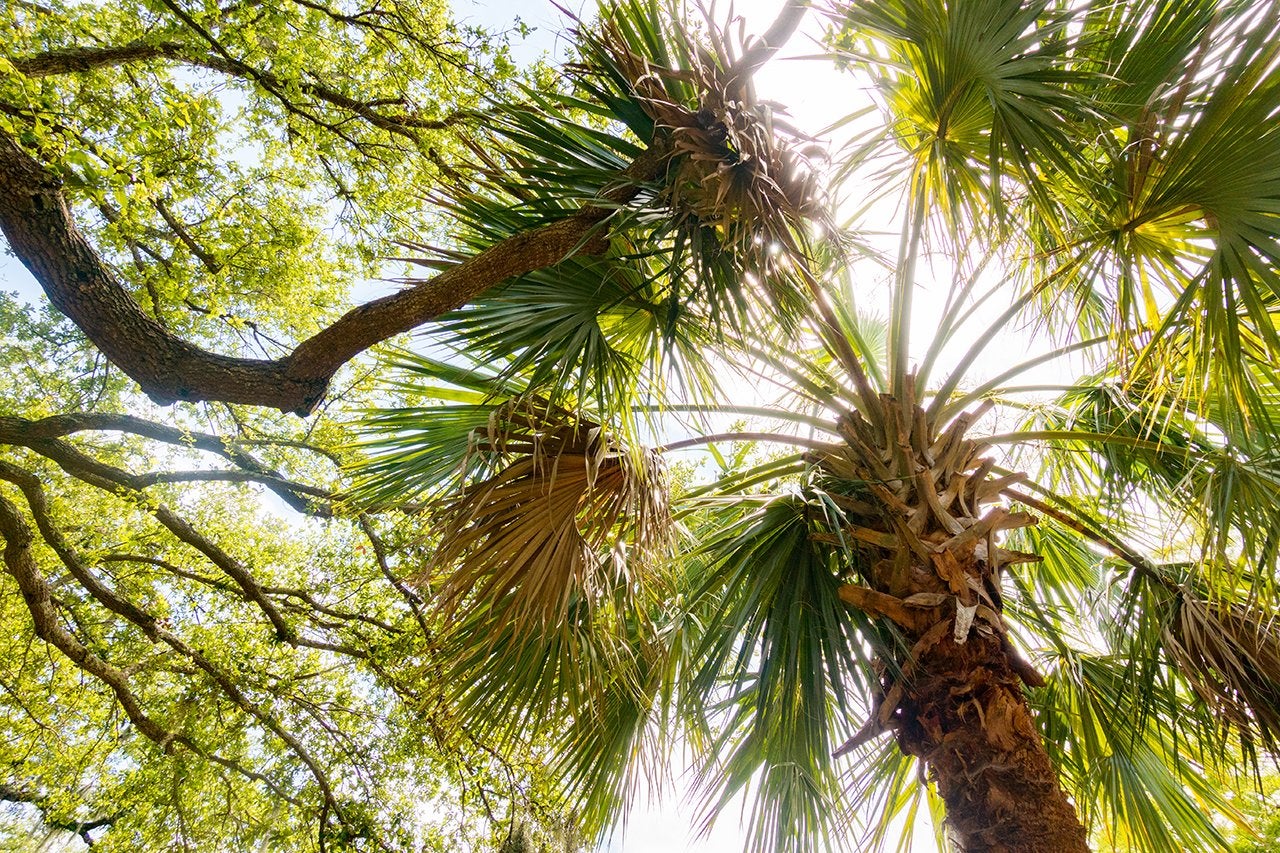The majestic oaks providing shade in the Cistern Yard, the cedar of Lebanon providing tradition at the annual Sottile tree lighting ceremony, the bald cypresses providing evidence of autumn in the Cougar Mall, the longleaf magnolias, the loquats, the palmetto trees: The College of Charleston’s trees give our campus distinction, making it a recognizable and unique place. And now, they’re getting some recognition of their own.
The Arbor Day Foundation has officially recognized the College of Charleston as a 2021 Tree Campus Higher Education, a distinction that the entire campus community can be proud of.
“Tree Campuses and their students set examples for not only their student bodies but the surrounding communities showcasing how trees create a healthier environment,” says Dan Lambe, president of the Arbor Day Foundation, the world’s largest membership nonprofit organization dedicated to planting trees. “Your entire campus community should be proud of this sustained commitment to environmental stewardship.”
Tree Campus Higher Education began in 2008 to encourage colleges and universities to plant trees on their campuses and to honor them and their leaders for promoting healthy trees and engaging students and staff in the spirit of conservation. There are currently 411 campuses across the country with this recognition. Collectively, Tree Campus Higher Education schools planted 31,584 trees in 2021, engaging 26,448 students.
The College achieved the title by meeting Tree Campus Higher Education’s five standards: maintaining a tree advisory committee, creating a campus tree-care plan, dedicating annual expenditures for its campus tree program, observing Arbor Day and engaging students in a service-learning project.
“This designation means the College is a leader in supporting a healthy tree canopy and creating green space while also recognizing the value these efforts have in the face of a changing climate,” says Darcy Everett, director of sustainability in the Center for Sustainable Development (CSD). “Tree Campus Higher Education provides a framework for colleges to grow their community forests, achieve national recognition and create a campus where staff and students are proud members. The Grounds team, who are the true stewards of our beautiful trees, can now take even more pride in their nationally recognized campus.”
Indeed, Grounds Manager Verneil Phillips couldn’t be more proud of his team – and he’s happy to have their efforts officially acknowledged.
“The hard work that the Grounds team provides to this campus takes a lot of dedication every day. It does not happen without the passion and knowledge these guys have and learn when they join the CofC team,” he says, adding that – although the College had obtained arboretum status in 1991 – it had lapsed in accreditation. “When Sustainability and Grounds started discussing ideas about re-certifying campus, we thought this was a great start to support our trees on campus.”
Everett says CSD student-intern Hanna Giblin spent two semesters working on the research, development and implementation of this effort.
“This achievement shows what our amazing students are capable of at the College of Charleston,” says Everett. “And, because of her hard work and the incredible hard work of our Grounds team, we can now say we are a certified Tree Campus. That makes me incredibly proud!”
It makes Giblin proud, too.
“While our journey in being a Tree Campus is just beginning, on a personal level, it’s a bit of a dream come true,” says the rising senior double-majoring in public health and sociology, who decided to pursue the recognition when she realized the College was the only South Carolina campus that had not been designated a Tree Campus Higher Education.
“For such a beautiful campus that proudly supports our biodiversity on campus, it was shocking to me to learn that we had very limited resources in using our campus environment as an educational tool and inspiration toward supporting sustainability and biodiversity,” she says. “This certification really stood out to me, because their mission is not to simply praise campuses with biodiversity, but to promote a culture of conservation, service learning and increasing the educational value of our landscape.”
And so she set about making it happen.
“It took quite a bit of collaboration across campus,” says Everett, adding that it was Giblin’s idea to connect with the College’s Landscape Committee, which consists of staff, faculty and students representing the CSD, Facilities Management and the departments of biology, historic preservation and residence life. “Hanna presented to the Landscape Committee to get their buy-in and support for this endeavor, which they gave with resounding positivity.”
“When I first began pitching this program, I wasn’t sure if I, a fairly anxious but highly passionate student, had the ability to gain support for a program that requires such widespread involvement across our campus,” says Giblin. “Being able to see this project through from start to finish (or, in this case, a new beginning), I am not only more confident in myself as a leader of sustainability, but I am incredibly proud and grateful for all of the support we have received for these efforts.”
After establishing the Campus Tree Advisory Committee in November 2021, Giblin worked to create the Tree Campus Master Plan with the mission of fostering a deeper connection between the City of Charleston, the College community and the landscape of the College campus.
“Through recognizing and supporting our green spaces as the complex ecosystems they are, we will enhance a place of education, recreation and wildlife conservation to celebrate the beauty and science of the nature we are lucky to experience in an urban setting,” the mission statement reads. “This establishment as a Tree Campus is a crucial step toward improving the overall sustainability and biodiversity of our College campus.”
Having already created a tree catalog and a Google Maps College of Charleston Tree Map as an informal record for the public to learn about various tree and plant species on campus, the Campus Tree Care Plan’s goals include increasing education and advocacy for tree/environmental conservation, developing a protocol for consistent tree identification signage across campus, coordinating efforts with graduate programs in environmental and sustainability studies and holding Arbor Day observances and service-learning opportunities annually.
“Maintaining this certification requires a commitment to conservation and sustainability,” says Giblin, explaining that the designation is valid for five years and then requires a presentation of the progress the College has made in terms of additional conservation efforts, sustainability measures and service-learning programs. “This certification highlights our existing commitment to sustainability and the beauty of our campus at a national level, while pushing us even further to make these topics an issue of everyday life at CofC. It provides a common goal to unite our community under as we work to preserve the beauty of our campus while increasing its biodiversity and growing stronger as a CofC family.”
“This kind of work is not done by one person,” agrees Phillips. “The employees that work here care about this historic campus, and it is nice to work as a team. I am proud of our team of Darcy, Hanna and myself that we could work together and get our campus re-certified. Now that the hard work is done, we can continue to do the things it takes to progress our certification.”
Giblin, for her part, is excited to see that progress unfold.
“I hope that the future of this certification and its programs further the mindfulness and shift toward sustainability that we have been working toward at the College,” she says. “I cannot wait to see where this program goes and I hope our campus community takes full advantage of what this program can provide to our campus culture. It is not a program that starts and ends with us, but something that we can hopefully continue at the College for years or even decades moving forward.”
For more information about the College’s Tree Campus Higher Education certification – or to get involved – email [email protected].

